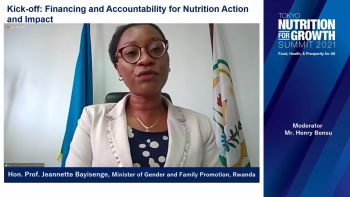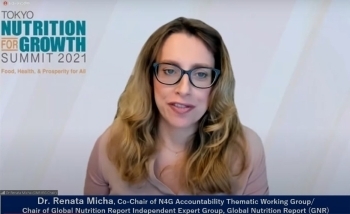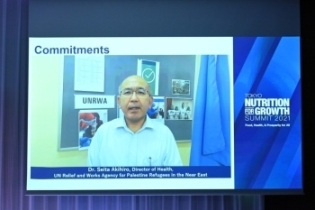Health and Medical Care
Results Overview of the Tokyo Nutrition for Growth (N4G) Summit 2021



On December 7, commencing at 8 p.m. (JST) for approximately three hours, and on December 8, commencing at 7 p.m. (JST) for approximately four and half hours, the Tokyo Nutrition for Growth (N4G) Summit 2021 hosted by the Government of Japan was held in a hybrid format that combines on-site participation of domestic participants and on-line participants from overseas. From Japan, at the High Level sessions on the first day, Mr. KISHIDA Fumio, Prime Minister of Japan, introduced Japan’s actions to nutritional improvement and announced that Japan will provide nutrition-related oversea assistance, which will amount to over 300 billion Japanese yen, equivalent to more than around 2.8 billion U.S. dollars, for the next three years,and will contribute to the achievement of the Universal Health Coverage. In addition, Mr. HAYASHI Yoshimasa, Minister for Foreign Affairs, made welcome and closing remarks and Ms. SUZUKI Takako, State Minister for Foreign Affairs, wrapped up the Session 1 and the Session 2.
At the Thematic Sessions on the second day, Minister of Agriculture, Forestry and Fisheries, Mr. KANEKO Genjiro, and Minister of Health, Labour and Welfare, Mr. GOTO Shigeyuki (read by Mr. SATO Hidemichi, State Minister of Health, Labour and Welfare), made opening remarks. As the outcomes of two-day discussions at the Tokyo N4G Summit, “Tokyo Compact on Global Nutrition for Growth” was issued. The next Nutrition for Growth Summit is scheduled to be held in France in 2024.
- At the Tokyo N4G Summit 2021, a wide range of stakeholders, such as governments, international organizations, private sector, civil society and academia, participated, and discussed focusing on the five thematic areas; (1) Health, (2) Food, (3) Resilience, (4) Accountability and (5) Financing, with considering worsened global situation on nutrition due to the COVID-19, as well as the escalation of the double burden of malnutrition which we experience, regardless of high-income or resource-limited countries, the co-existence of undernutrition that hinders growth and overnutrition that causes lifestyle related diseases.
- At the High Level Sessions on December 7, more than 50 participants including leaders and ministerial levels from about 30 countries, as well as heads of international organizations, representatives from private sector, civil society and academia explained their efforts to improve nutrition.
- At the beginning of the Thematic Sessions held on December 8, Minister of Agriculture, Forestry and Fisheries, Mr. KANEKO stated that there is no one-size-fits-all solution for transforming food systems, and food industries can contribute to improvement of nutrition through innovation. He also pointed out the importance of changing behavior of individuals through shokuiku (food education) and of assisting developing countries through public-private partnership. State Minister of Health, Labour and Welfare, Mr. SATO delivered a message on behalf of Minister of Health, Labour and Welfare, Mr. GOTO, and stated that there is urgent need for the world to work together to promote nutrition improvement amid concerns that more people suffer from malnutrition due to the global pandemic. Panel Discussions on three themes; (1) Health, (2) Food, and (3) Resilience were held and a wide variety of stakeholders from governments, international organizations, private sector, civil society, and academia participated in each panel as panelists and discussed directions of future actions. In addition, the two other themes, Accountability and Financing, were also discussed as a cross-cutting agenda.
- On the occasion of the Tokyo N4G Summit 2021, more than 120 official side events for improving nutrition were organized by a variety of domestic and international stakeholders. In these events, taking into consideration of Japan's efforts on nutrition-related issues in both Japan and overseas by industry, government, and academia, participants have been exchanging their views toward nutritional improvement and disseminating their efforts.
- During the two-day Summit, at least 331 commitments from 156 stakeholders including 66 countries and 20 private sectors were submitted (note: eventually, 396 commitments from 181 stakeholders including 66 countries, 26 private sectors, and 51 civil societies were submitted) and the financial contribution amounting to over 27 billion U.S. dollars was announced. The Tokyo N4G Summit achieved outcomes exceeding the ones at the previous Nutrition for Growth Summits.
- At this Tokyo N4G Summit, the Tokyo Compact on Global Nutrition for Growth was issued as an outcome document that indicates concrete direction for the international society to improve nutrition. The Tokyo Compact has received endorsements from 212 stakeholders including governments of 64 countries, 11 international organizations, 60 private sectors, and 58 civil societies (note: eventually, the Tokyo Compact was endorsed by 215 stakeholders including 65 countries, 11 international organizations, 60 private sectors, and 58 civil societies). In the Tokyo Compact, specific directions in the five areas of Health, Food, Resilience, Accountability, and Financing were addressed to end malnutrition by 2030.
(Reference 1) Nutrition for Growth Summit in London (2013)
90 stakeholders including 39 countries and 19 private sectors announced commitments. A new financial contribution to nutrition-related issues amounting to 4.15 billion U.S. dollars was announced.


 /
/ 